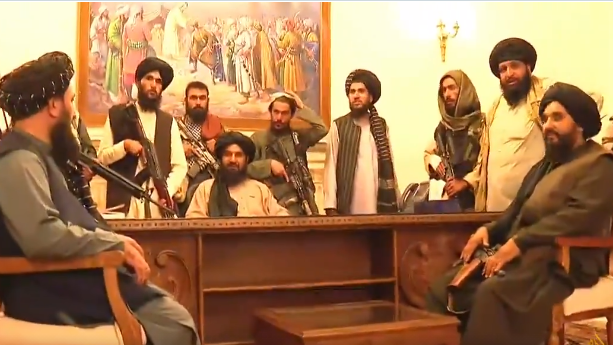Haibatullah Akhundzada, the supreme leader
Mullah Haibatullah Akhundzada was appointed head of the Taliban in May 2016 during a rapid transition of power, days after the death of his predecessor, Mansour, killed by a strike from an American drone in Pakistan.
Before his appointment, little was known about Akhundzada, until then more versed in judicial and religious matters than in the art of war.
If this scholar enjoyed great influence within the insurgency, of which he led the judicial system, some analysts believed that his role at the head of the movement would be more symbolic than operational.
Son of a theologian, originally from Kandahar, the heart of the Pashtun country in southern Afghanistan and cradle of the Taliban, Akhundzada quickly obtained a pledge of loyalty from Ayman al-Zawahiri, the leader of Al- Qaeda.
Read also: The return of the Taliban to Kabul seals the rout of the West
The Egyptian described him as "
emir of the believers
", an appellation which allowed him to establish his credibility in the jihadist universe.
Akhundzada had the delicate mission of unifying the Taliban, fractured by a violent struggle for power after Mansour's death and the revelation that they had hidden for years the death of the movement's founder, Mullah Omar.
He managed to keep the group together and continued to remain rather low-key, limiting himself to broadcasting rare annual messages on Islamic holidays.
Mullah Baradar, the co-founder
Abdul Ghani Baradar, born in Uruzgan province (south) and raised in Kandahar, is the co-founder of the Taliban with Mullah Omar, who died in 2013 but whose death had been hidden for two years.
Like many Afghans, his life was transformed by the Soviet invasion in 1979, which made him a mujahid, and it is possible that he fought alongside Mullah Omar.
Read also: Afghanistan: bitter, the inhabitants of Kabul are preparing for the return of bans and corporal punishment
In 2001, after the American intervention and the fall of the Taliban regime, he was said to have been part of a small group of insurgents ready for an agreement in which they recognized the administration of Kabul.
But this initiative turned out to be unsuccessful.
He was the Taliban's military leader when he was arrested in 2010 in Karachi, Pakistan.
He was released in 2018, especially under pressure from Washington.
Listened to and respected by the various Taliban factions, he was then appointed head of their political office, located in Qatar.
From there, he led the negotiations with the Americans leading to the withdrawal of foreign forces from Afghanistan, then to peace talks with the Afghan government, which came to nothing.
Sirajuddin Haqqani, the head of the Haqqani network
Son of a famous anti-Soviet jihad commander, Jalaluddin Haqqani, Sirajuddin is both number two in the Taliban and the leader of the powerful network bearing his last name.
The Haqqani network, founded by his father, is described as terrorist by Washington, which has always regarded it as one of the most dangerous factions fighting American and NATO troops over the past two decades in Afghanistan.
The network is known for its use of suicide bombers and has been credited with some of the most violent attacks in Afghanistan in recent years.
Read also: Afghanistan: the colossal bankruptcy of American intelligence
He was also accused of having assassinated certain senior Afghan officials and of having held Westerners hostage, before releasing them for ransom or prisoners, such as the American soldier Bowe Bergdahl, released in 2014 in exchange for five Afghan detainees from Guantanamo prison.
Known for their independence, their fighting skills and their juicy affairs, the Haqqani are said to be in charge of Taliban operations in the mountainous areas of eastern Afghanistan, and would have a strong influence on the movement's decisions.
Mullah Yaqoub, the heir
Son of Mullah Omar, Yaqoub is the head of the powerful Taliban military commission, which decides on strategic orientations in the war against the Afghan government.
His ancestry and ties to his father, who was worshiped as leader of the Taliban, make him a unifying figure in a large and diverse movement.
Read also: America stunned by the scale of its defeat in Afghanistan
Speculation about his exact role in the movement is persistent, however.
Some analysts believe that his appointment as head of this commission in 2020 was only symbolic.

